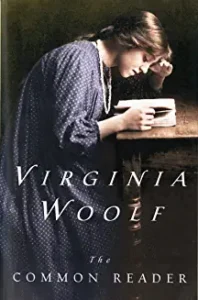The Common Reader: First Series by Virginia Woolf 1925
Woolf, who drowned herself in 1941 after a lifetime of depression and superb artistic achievement, wrote these essays at the same time she was publishing the modernist novels that broke new ground in form and content. In contrast, her essays conformed to the critical essay format developed by the English critics, “Dryden, Johnson, Coleridge, and Arnold”.
In his introduction, Andrew McNeillie, the literature editor of the Oxford University Press, wrote that Woolf was content to ‘write, as a reviewer, essays that share something of the immediacy, the flashing brilliance and unscholarliness of conversation in which quotations are capped and a dinner-table intimacy is assumed.” Woolf writes that reading is not a spectator sport and ‘passivity’ is the pitfall readers must at all costs avoid. The reader must become the writer’s accomplice by participating in the ‘complex art’ of reading. McNeillie goes on to say that Woolf’s reading was that of an educational outsider, a Victorian woman schooled primarily in her father’s library so that many of these reviews reflect an outsider’s lively interest in obscurities, providing an ‘unofficial, eccentric, literary, and social history from the 14th to the 20th C’.
And obscurities abound in this wonderful book of critical literary essays. From John Paston’s reading of Chaucer in the mid-1400’s to the Duchess of Newcastle who lavished her wealth on writing volumes of plays, poems, and novels in the mid-1600’s, from an aptly named essay on “Lives of the Obscure’ about three writers in the mid-1700’s to the four obscure writers of the early 1800’s in an essay entitled ‘Outlines, Woolf writes about individuals and their writing that are as little known today as they were 100 years ago when she was writing about them.
In contrast, her essays on Montaigne, Jane Austen, George Eliot, the Brontes, Daniel Defoe, Joseph Addison and Joseph Conrad are classic literary criticism, bright with concise observations conveyed in fine writing. One of her most famous essays, ‘Modern Fiction’, is a centerpiece of this volume, dismissing Galsworthy, Wells and Bennett while canonizing Hardy, Conrad, and Joyce. Reading it was a treat to be returned to again.
This volume may not appeal to ‘the common reader’, but for those who love good writing about other’s good writing, it’s a book well worth savoring. Woolf was a tragic but triumphant author—inventing new modes of expression in her novels and holding forth with brilliant commentary about the work of others. Interestingly, two other books of essays by contemporary authors, Zadie Smith’s ‘Intimations’ and Hilary Mantel’s ‘Mantel Pieces’ both reference Woolf, one of the 20th C’s most important writers.



